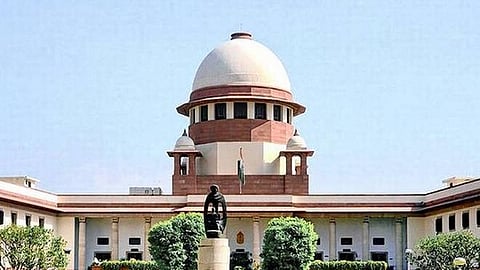

NEW DELHI: India's top court swiftly put an end to a 30-year legal battle by acquitting a man booked for abetting the suicide of his wife in 1993 and expressing concern over the prolonged ordeal faced by the accused.
Naresh Kumar had been booked for abetting the suicide of his wife in 1993 and had fought the case in Punjab and Haryana trial courts, as well as the High Court, which upheld his conviction in 2008.
Kumar's ordeal came to an end on February 22 after a two-judge bench of Justices JB Pardiwala and Manoj Misra acquitted him after noting that the mere harassment of the deceased woman at the hands of the accused husband is not enough to constitute guilt for the abetment of suicide.
"The criminal justice system of ours can itself be a punishment. It did not take more than 10 minutes for this Court to reach an inevitable conclusion that the conviction of the appellant convict (Naresh Kumar) for the offence punishable under Section 306 (Abetment of Suicide) of the IPC (Indian Penal Code) is not sustainable in law," an anguished bench noted in its order.
While noting that the instant case lacked clinching evidence to convict the appellant-husband, Kumar, the apex court observed that the ordeal for him started in 1993 and is coming to an end in 2024, i.e., almost after a period of 30 years of suffering.
Remarking that mere allegations of harassment were insufficient to constitute abetment, the SC bench said that “it also requires an active act or direct act that led the deceased to commit suicide. The ingredient of offence has to be visible and conspicuous," the SC reasoned in its order.
The top court noted in its order that it was mindful of the fact that a young woman had died, leaving behind her six-month-old infant and that no crime should go unpunished.
"But at the same time, the guilt of the accused has to be determined in accordance with the law," the court pointed out.
The Apex Court passed these observations after hearing the appeal filed by Kumar against a Punjab and Haryana High Court order passed in 2008.
According to the prosecution, Kumar had been accused of harassing his wife and driving her to die by suicide in November 1993.
A trial court convicted Kumar in 1998 and the High Court later upheld the trial court's decision to sentence the husband under Section 306 of the IPC.
If you are having suicidal thoughts, or are worried about a friend, or need emotional support, someone is always there to listen.
Call Sneha Foundation - 04424640050, Tele Manas - 14416 (available 24x7) or iCall, the Tata Institute of Social Sciences' helpline - 02225521111, which is available Monday to Saturday from 8 am to 10 pm.